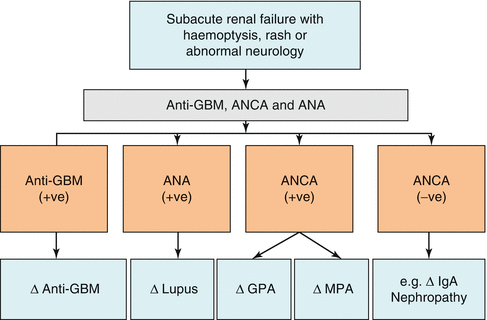and Christopher Isles2
(1)
Institute of Cardiovascular and Medical Sciences, University of Glasgow, Glasgow, UK
(2)
Dumfries and Galloway Royal Infirmary, Dumfries, UK
Q1 What do you understand by the term Rapidly Progressive Glomerulonephritis (RPGN)?
RPGN (also known as crescentic nephritis) is the most aggressive form of glomerulonephritis. It is characterised by sub-acute renal failure i.e. renal failure that develops over a matter of weeks rather than hours to days (acute kidney injury) or months to years (chronic kidney disease). It is important to recognise that if not suspected, diagnosed and treated as a matter of urgency then the renal failure is likely to be irrecoverable with patients becoming dialysis dependent permanently.
Q2 What are the causes of RPGN?
The most important causes are the ANCA positive systemic vasculitides; granulomatous polyarteritis (GPA) – previously “Wegener’s Granulomatosis”- and microscopic polyarteritis (MPA). Anti-GBM disease, diffuse lupus nephritis and some forms of primary glomerulonephritis especially IgA nephropathy, may also present with rapidly progressive nephritis.
Box 19.1 Specific Causes of RPGN
Granulomatous Polyarteritis (Wegener’s)
Microscopic Polyarteritis
Anti-GBM disease
Diffuse lupus nephritis
Primary GN especially IgA nephropathy
Q3 When should you suspect RPGN?
When a patient presents with unexplained kidney injury and something else. It may be helpful to think of RPGN as ‘Renal failure plus’ in much the same way we think of ‘Parkinson’s plus’ and ‘Rheumatoid plus’ syndromes. The most common ‘plus’ is the lung i.e. patient presents with a Pulmonary Renal Syndrome. Other organs/tissues that may be involved are the skin (vasculitic rash) and the nervous system (mononeuritis multiplex). The different types of other system involvement in patients with RPGN are summarised in Box 19.2.
Box 19.2 Presentation of RPGN
Systemic e.g. fever, night sweats, weight loss, malaise (All)
ENT involvement with sinusitis and otitis media (GPA)
Dyspnoea, cough, haemoptysis (GPA, MPA, anti-GBM)
Photosensitivity, arthralgia, skin rash (SLE)
Q4 What should you do if you suspect RPGN?
Confirming the diagnosis is essential to allowing timely management to preserve renal function. Patients will usually require:
1.
An urgent vasculitis screen and
2.
An urgent renal biopsy
Q5 What is meant by an urgent vasculitis screen?
Patients with suspected RPGN should have a clotted blood sample sent urgently to Immunology for ANCA screen, ANA and anti-GBM antibodies. ANCA stands for anti-neutrophil cytoplasmic antibodies. Two specificities are recognised. Patients with GPA have high titres of anti-proteinase 3 (anti-PR3) antibody while those with MPA have high titres of anti-myeloperoxidase (anti-MPO) antibodies. These serological tests help distinguish five causes of RPGN as shown in Fig. 19.1:
 < div class='tao-gold-member'>
< div class='tao-gold-member'>





Only gold members can continue reading. Log In or Register to continue
Stay updated, free articles. Join our Telegram channel

Full access? Get Clinical Tree








